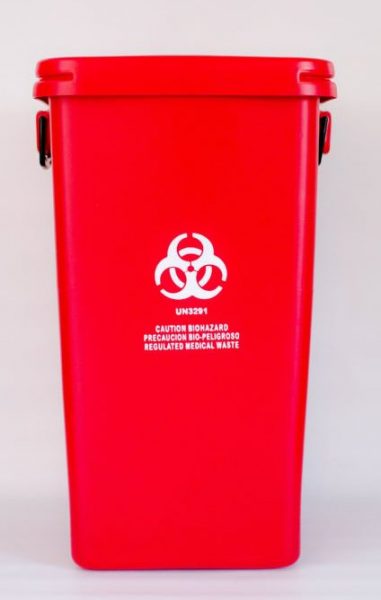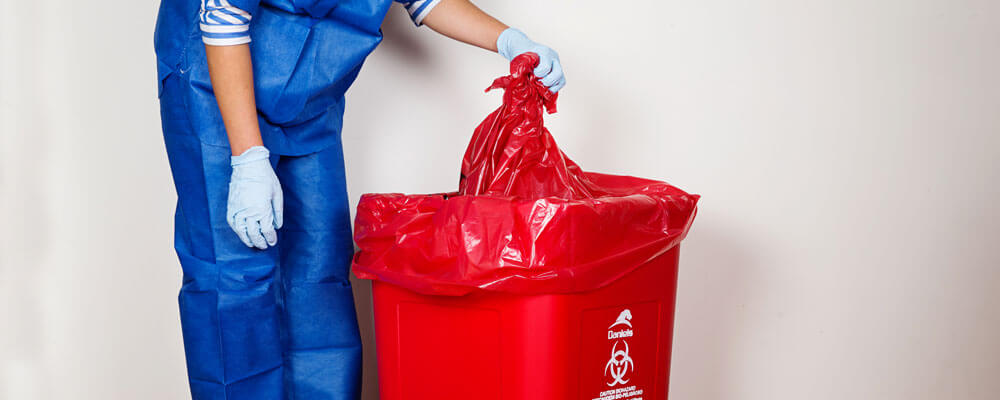Guardians of Sanitation: Citizen Medical Waste Removal Service for Your Assurance
Guardians of Sanitation: Citizen Medical Waste Removal Service for Your Assurance
Blog Article
Remain Ahead of Laws: Expert Recommendations on Medical Garbage Disposal
In a world where the health care sector is continuously progressing, it is imperative for clinical facilities to remain ahead of laws when it concerns the correct disposal of clinical waste. With stringent standards and constant governing adjustments, it can be testing to browse the intricacies of this procedure. With professional guidance, facilities can make sure compliance and reduce risks associated with improper waste disposal. From recognizing the various classifications of medical waste to implementing the right collection and partition techniques, this discussion will give beneficial understandings and actionable tips to aid centers stay in advance of guidelines in the ever-changing landscape of medical waste disposal.
Comprehending Medical Waste Categories
Comprehending clinical waste categories is crucial for correct disposal and administration in medical care facilities. Clinical waste describes any waste produced by medical care activities that may posture a risk to public health and wellness or the environment. It is important to classify clinical waste accurately to guarantee its secure handling, disposal, transport, and therapy.
There are a number of groups of clinical waste that healthcare facilities need to be accustomed to. One of the most usual categories include contagious waste, pathological waste, sharps waste, pharmaceutical waste, and chemical waste. Each group has details guidelines and policies for its appropriate administration and disposal.
Contagious waste consists of products infected with blood or various other physical liquids, such as handwear covers, dress, and laboratory cultures. Pathological waste describes human tissues, organs, or body parts that need special delivery and disposal. Sharps waste consists of made use of needles, syringes, and various other sharp objects that can cause injury and transfer infections. Pharmaceutical waste makes up expired, unused, or polluted medications that need careful handling and disposal. Chemical waste includes solvents, anti-bacterials, and other chemical compounds utilized in healthcare facilities.
Staying Up-To-Date With Regulatory Adjustments
Remaining present with regulative modifications is essential for healthcare centers to make certain conformity and appropriate management of clinical waste disposal. medical waste removal. With laws frequently progressing, it is important for healthcare centers to stay current to prevent penalties, penalties, and prospective injury to the atmosphere and public health
To remain ahead of governing modifications, medical care facilities should develop a system for monitoring and monitoring updates. This can be done by registering for regulative newsletters, participating in conferences and workshops, and actively getting involved in industry organizations. Additionally, centers should assign a team member or group accountable for remaining informed and distributing information to appropriate stakeholders.
Normal communication with regulative agencies is likewise vital. Healthcare facilities need to establish partnerships with local, state, and government firms to ensure they understand any modifications in regulations that may influence their waste management methods. This can be done via regular conferences, involvement in public remark periods, and proactive engagement with regulative firms.
Furthermore, medical care facilities must take into consideration partnering with waste monitoring companies that concentrate on clinical waste disposal (medical waste disposal services with WasteX). These business are frequently well-versed in the most recent laws and can offer guidance and assistance to make sure compliance
Executing Appropriate Collection and Partition Approaches
To properly take care of clinical garbage disposal, healthcare facilities must establish correct collection and partition approaches based on governing standards. Applying these approaches makes certain the secure handling and disposal of possibly unsafe products, protects the setting, and minimizes the danger of infections and injuries to health care employees and the basic public.
Appropriate collection and segregation techniques entail using marked containers and labeling systems. Healthcare facilities need to supply plainly classified containers for different kinds of clinical waste, such medical waste disposal services with WasteX as sharps, contagious waste, pharmaceutical waste, and non-hazardous waste. These containers should be color-coded and plainly marked to stay clear of complication and advertise very easy recognition.
Furthermore, health care facilities should train their team on the correct treatments for accumulating and setting apart medical waste. This includes educating them on the various kinds of waste, the ideal containers to utilize, and the value of complying with guidelines and standards. Normal training sessions and refresher course programs ought to be performed to make sure that team member stay up-to-date on finest practices.
In addition, medical care facilities must develop a system for regular collection and disposal of clinical waste. This may include partnering with licensed waste administration firms that focus on clinical waste disposal. These firms will make sure that the accumulated waste is moved and gotten rid of in conformity with regulatory demands.
Picking the Right Disposal Methods

Incineration is one of the most common and effective methods for throwing away particular kinds of clinical waste, such as pathological waste and sharps. It includes the regulated combustion of waste at heats, minimizing it to ash. Nevertheless, incineration can launch unsafe toxins right into the air this and add to air contamination.

Various other disposal techniques consist of chemical treatment, microwave therapy, and landfilling. Chemical treatment entails making use of chemicals to counteract the waste and disinfect. Microwave therapy uses microwave power to warmth and sanitize the waste. Landfilling entails burying the waste in a marked landfill area (medical waste disposal services with WasteX). Nonetheless, landfilling needs to be the last option due to the potential danger of contamination to soil and groundwater.
Guaranteeing Compliance Through Documentation and Training
After thoroughly thinking about the proper disposal techniques for medical waste, healthcare facilities must make certain conformity with guidelines and lessen ecological impact by applying reliable paperwork and training procedures. This step is crucial in keeping a sustainable and safe setting for both health care workers and the public.

Training is just as essential in making sure conformity with laws. Healthcare workers who manage clinical waste needs to receive suitable training on waste partition, taking care of, and disposal treatments. This training should cover topics such as the proper use personal protective devices, recognition of various sorts of waste, and the proper disposal approaches for each waste classification. By supplying thorough training, medical care centers can encourage their staff to make informed decisions and reduce the danger of incorrect garbage disposal.
Final Thought
In conclusion, remaining ahead of policies in medical waste disposal is essential for medical care facilities. medical waste removal service. Recognizing the various classifications of medical waste, remaining updated with regulatory adjustments, executing proper collection and partition techniques, picking the proper disposal methods, and ensuring conformity through documents and training are all crucial actions. By following these standards, health care organizations can successfully handle and get rid of of medical waste in a responsible and secure manner
From recognizing the different groups of medical waste to implementing the ideal collection and segregation approaches, this discussion will certainly supply actionable pointers and important understandings to help facilities remain ahead of guidelines in the ever-changing landscape of medical waste disposal. - medical waste disposal services with WasteX
The most usual groups include contagious waste, pathological waste, sharps waste, pharmaceutical waste, and chemical waste. Medical care centers should provide clearly identified containers for various kinds of clinical waste, such as sharps, transmittable waste, pharmaceutical waste, and non-hazardous waste. Healthcare facilities must develop a detailed system to tape and track all elements of medical waste disposal, including types of waste generated, quantities, and disposal methods used. Healthcare workers that handle medical waste needs to obtain ideal training on waste partition, taking care of, and disposal treatments.
Report this page